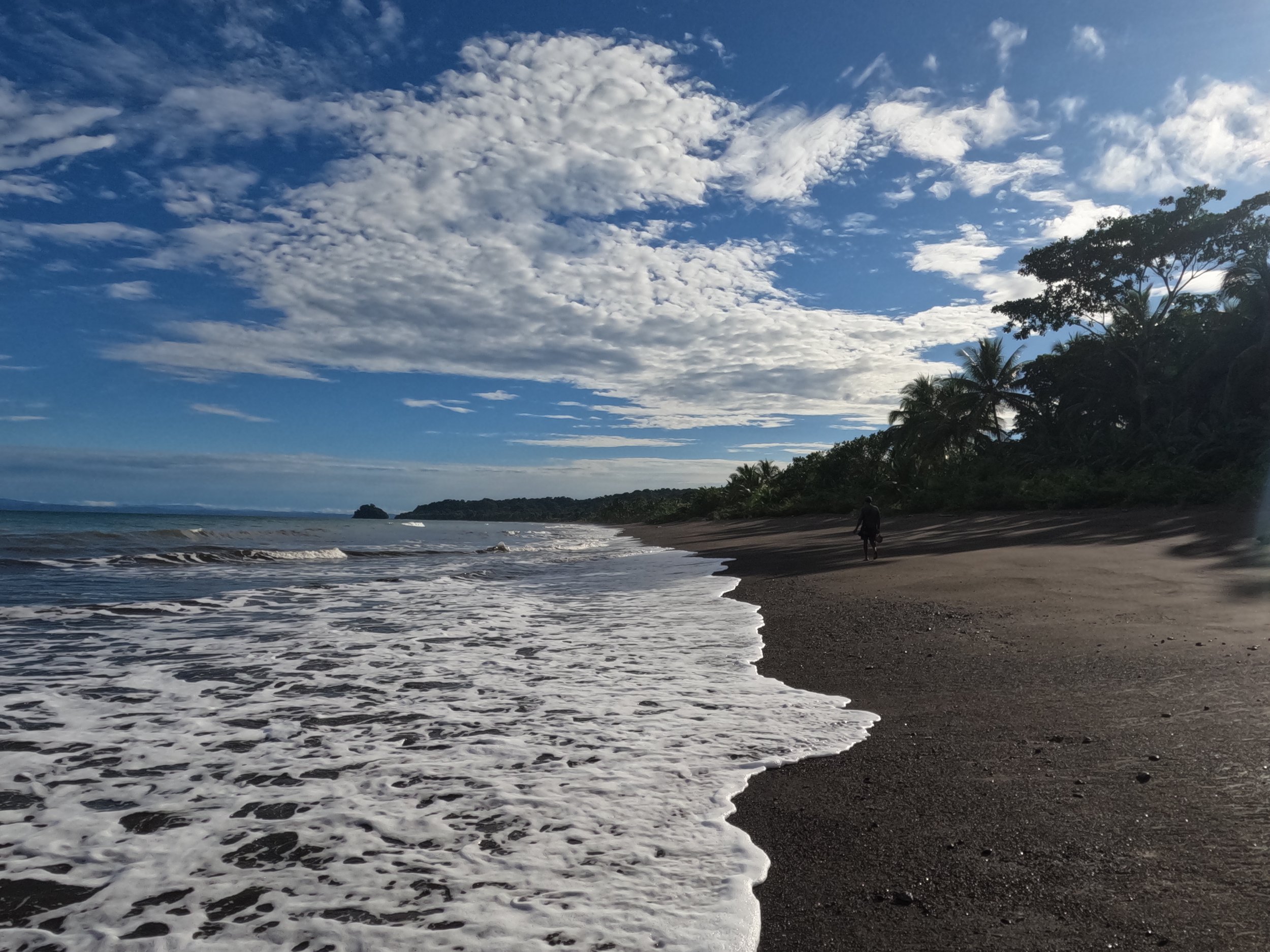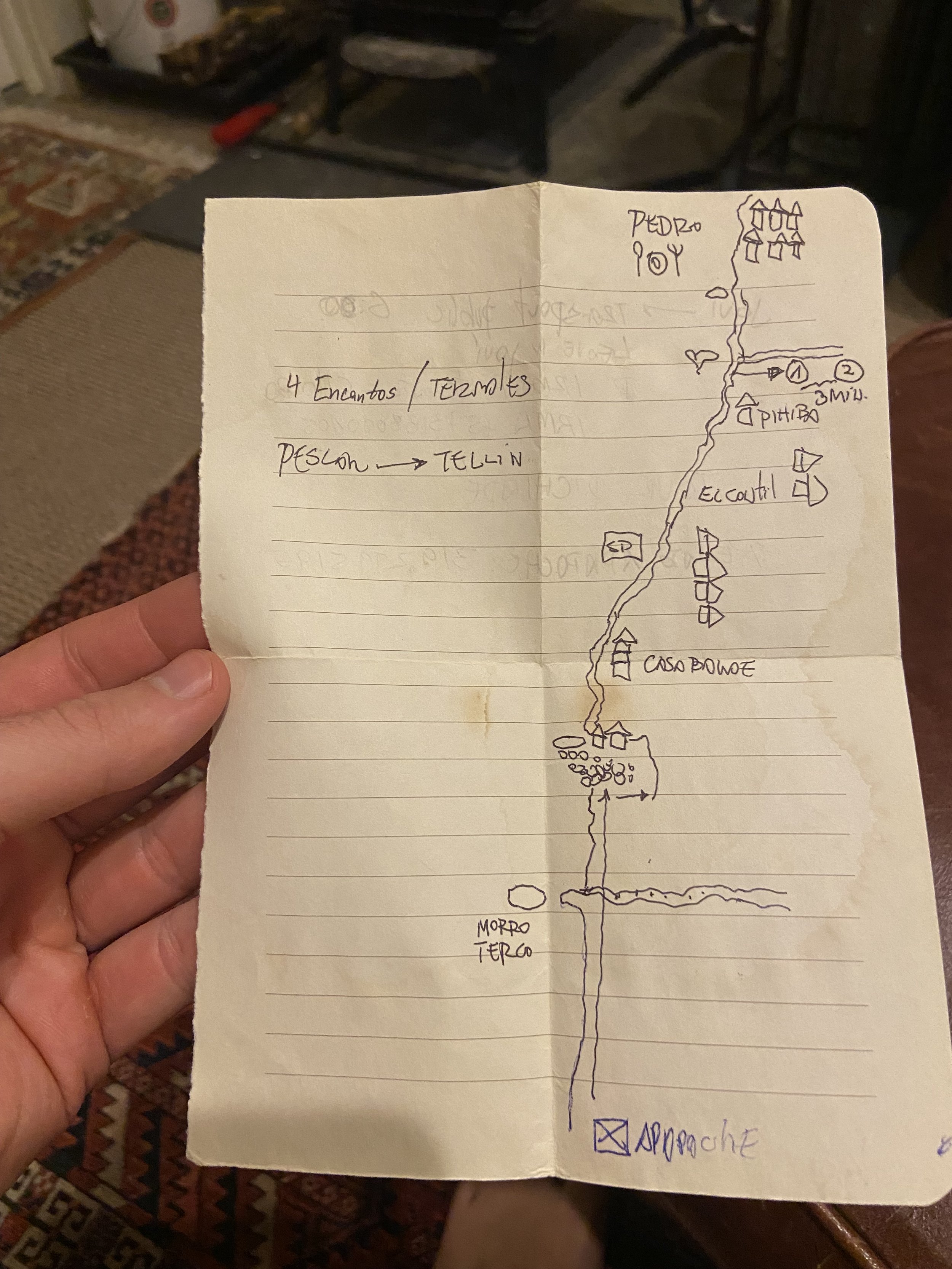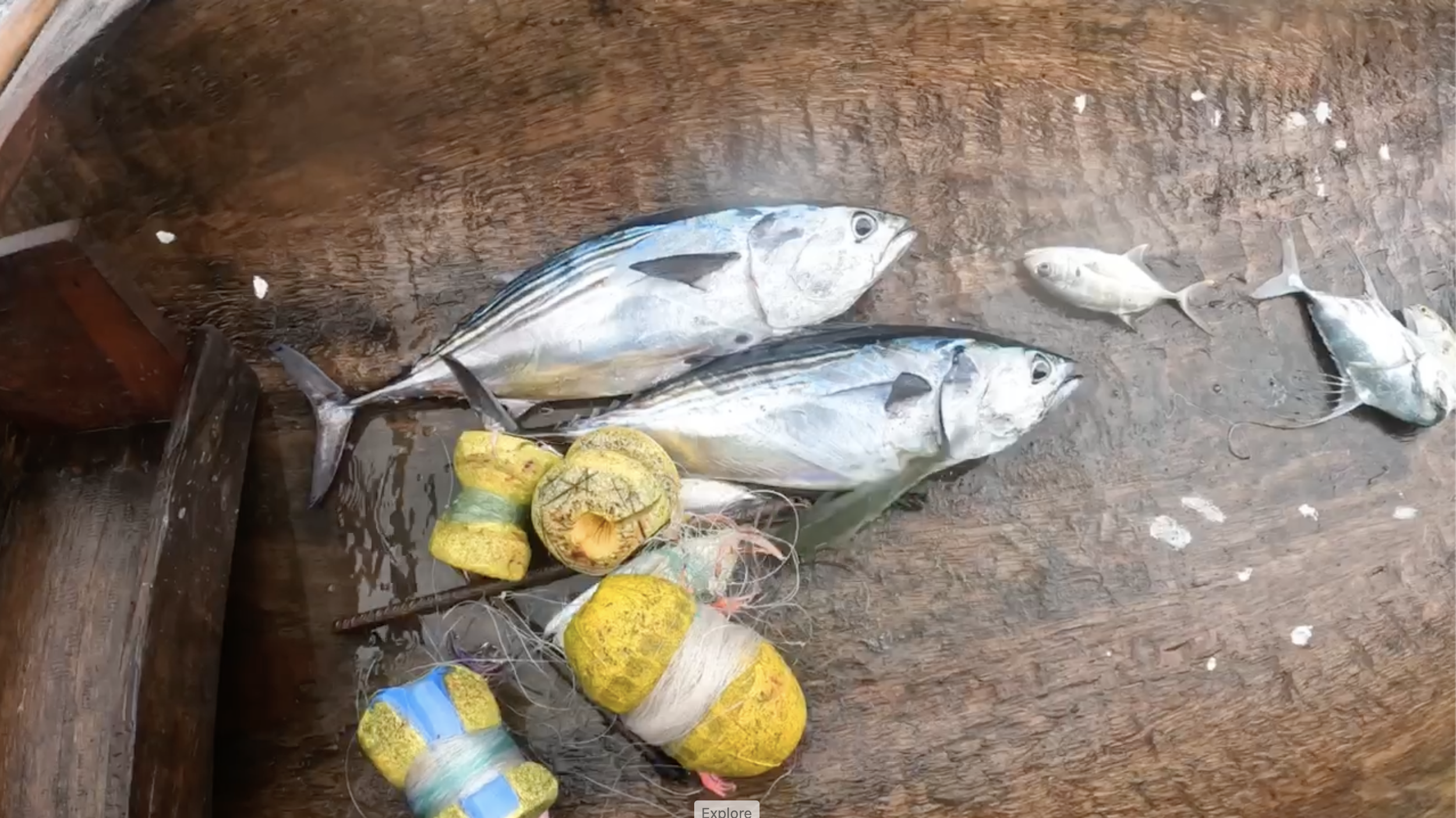Fishing for Lunch in Chocó, Colombia
*First published March 20, 2024, on Intrepid Times*
The coarse grain of the wooden paddle digs deeper into my right index finger with each stroke. The blister is completely open after having paddled the canoe out a handful of kilometers into the Pacific Ocean. The rain still hasn’t let up since we set off at 6 AM this morning. The seawater is as gray as the sky, making the horizon hardly distinguishable.
Willian whistles to signal a cease to my rowing; we’re dropping our lines again. I reach behind me for the yellow, algae-coated piece of foam and unspool the clear line from the buoy. Dropping the line over the left side of the canoe, I let the broken piece of rebar serving as our fishing weight sink three hooks into the depths of Chocó’s Gulf of Tribugá.
Two hours ago, looking out from my beachside shack this morning, I hardly expected to see the lone canoe approaching along the black sand beach. The leather-skinned fisherman coasted toward me, just far enough out to avoid the breaking waves that would surely bring him onto the sand too early. I donned a pair of swim trunks, stripped my shirt, and stuffed a wad of Colombian pesos into my back pocket. A phone is barely a glorified camera out in the remote expanse of Chocó.
Once perpendicular to my hut, Willian turned the canoe toward land, smoothly surfed a wave in, and stepped out to greet me. His build was like that of the other villagers on Chocó’s coast: dark skin turned to leather from eons of sun, lanky arms, a potbelly, and a disproportionately muscled upper back. His gray eyes and toothy grin betrayed his surprise at finding me awake and ready to go.
“You have a coco?” was the first and only thing he had asked me before setting out.
“A coco?” I looked above us to the bunches of green coconuts hanging from the palms along the beach. “To drink?”
Willian laughed and gestured towards his canoe. It was already half-full of rainwater from the ride over. “To take out the water. Find me a broken one.”
I scavenged the beach for the remains of a fallen coconut and brought one back over to Willian to bail water from the canoe. In less than a minute, it was completely dry. Grabbing both sides of the canoe, we pushed out along a receding wave and hopped in.
Setting off in the AM
The first two hours pass agonizingly slowly. The combination of rain hitting my bare back and exclusively paddling on my right side makes me shiver until my side cramps. Any slight movement to adjust position would be foolish though. The water licks the side of the canoe just 10 centimeters from its top. Any imbalance will smoothly dump both of us into the bay, something I care to avoid as Willian opted not to bring any lifejackets on our deep-sea fishing excursion.
I came out here with Willian to catch albacora (tuna). Yet, the most we’ve caught on our handlines are a couple of palm-sized fish that now sit—still flopping—between Willian and me in the boat. I continue jostling the handline with slow, controlled tugs, bringing my left hand from the side of the canoe across my body to my right shoulder as Willian showed me. Meanwhile, the fisherman reaches for one of our tiny catches and sticks a hook through the biggest of them. He tosses the live fish and corresponding buoy overboard, and the chum line immediately starts swimming around us.
After a few laps around the canoe, our chum line turns and beelines straight out into the gray horizon. My heart drops as I realize we’re going to have to chase him down eventually.
My mind wanders in my misery.
What had led me to this sordid state of affairs out at sea was undoubtedly my traveler ego. The day prior I had set out from my beachside hut to ask around the nearby town of Termales if anyone would take me fishing. I had been told before coming to Chocó that the tuna fishing was world-class. While I couldn’t confidently say I had sea legs, I was determined not to leave the Pacific narco-state without having attempted to catch an albacora.
The black sand beaches of Chocó
There were plenty of paid excursions throughout the small Afro-Colombian villages scattered along the coast of Chocó. Motorboats stood at the ready to take tourists out to the ocean, throw in a trolling line, and zip up and down the bay for a few hours. That didn’t sound like anything novel to me, though. I wanted to fish with someone who did it for their family, not for someone else’s Instagram.
The jungle of Chocó hardly affords a kilometer of beachfront before shrouding the rest of the state, and there was only one way to go once on the outskirts of Termales. Walking down the muddy dirt track serving as a lone main road, the villagers’ eyes drilled into me until I met their gaze, at which moment the eyes immediately flitted away. Nuquí was not a place where sheerly being a gringo would yield interest from others. If anything, they seemed apathetic to my presence.
I reached the end of the town without as much as a buenos días from anyone and disappointedly sat at the steps of a dark, empty restaurant. Behind the restaurant, the jungle turned into a menacing curtain of coconut-rich palm trees and dense ground foliage.
Jungle merges with village on Colombia’s Pacific coast
Chocó’s jungle is a known base of operations for many narcotraffickers and paramilitary groups in Colombia. Taking advantage of the infrastructure vacuum in the Pacific state’s interior, these groups run their businesses relatively uninterrupted. At night, it is said that narco boats troll through the bay under the cover of dark, making runs to Panama in two-ton shipments. If spotted by a patrol ship, that product is dumped overboard, where it circulates in the currents to designated recovery points back on shore. Once two tons are amassed again, it’s back on another boat northbound.
Behind me, a voice spoke: “We’re closed.”
Spinning around on the steps, I met the gaze of a rosy-faced man wearing an apron. He was bald and fairer skinned than anyone else in the village I’d seen so far.
“I’m not here to eat. I was just sitting here to think.”
“Think about what?” the bald man asked.
“How to go fishing tomorrow,” I responded, dusting myself off to be on my way. “Sorry to bother you.”
“All good. I am Martín, the owner of this restaurant. You want to go fishing?” he waved for me to follow him onto the open patio of the restaurant. “Come with me.”
Martín invited me to sit with him while he prepped the lunch menu. The Brazilian-born Chilean chef explained the story of how he came to own a restaurant in the remote jungle of Colombia. He told me about how he first found this stretch of jungle years ago, establishing the restaurant with his wife and kids, all the way through the recent departure of his family at the hands of a divorce. Now, only Martín remained here in Termales.
“So, you want to fish?” Martín changed subjects from his personal life. “I know someone who can take you. It will be in a canoe though. It will be early. It will not be easy. Are you prepared for that?”
I assured him that I was fit and ready for the job.
“Good. Then let me show you where to find Willian.” Martín tore a page out of his accounting logs and began drawing squiggly lines and squares. It was a hand-drawn map: every traveler’s dream artifact.
Handing it to me, he said, “Follow this to Willian’s house. Tell him that I sent you. He will take you fishing in the manner you look for.”
Martín’s map through Termales and its surroundings
Graciously, I thanked Martín for his hospitality and help. On my way out of his restaurant, Martín made one more comment.
“One more thing, chico. Remember that Willian and the rest of this village don’t fish for fun; they fish to feed themselves and their families. Be prepared to stay out as long as it takes to bring enough in.”
I walked back through Termales with renewed vigor. The town had woken up in the time I had been with Martín. Following his map through brick and bamboo buildings, the residents of Termales flooded the main path. The women tended to the cooking from open windows. The men carried rebar and 2x4s through the road while young boys stumbled behind them with wheelbarrows full of clay. Construction appeared to be the principal profession in Termales, although you wouldn’t be able to tell walking past the excess of half-finished foundations and buildings in serious need of repair.
Sure enough, at the point on the map where Martín indicated, I found five men playing cards under a wood awning.
“Willian?”
One stood up. “I am Willian. What do you want?”
“Martín sent me. I would like to go fishing with you.”
Willian chuckled and scanned me with his gray eyes, gauging whether my presence would hurt his fishing chances tomorrow. After about 10 seconds, he broke the silence.
“Sure. We leave at 6 AM. You will give me half of everything you catch. Listo?”
The hope I held out for Willian yesterday had disappeared since then as I began to question if he even knew what he was doing out here in the bay. If it wasn’t for Martín’s reminder, I would’ve already asked to go back to shore.
Seemingly endless paddling with Willian
Willian’s finger taps my shoulder to bring me back to the present and then points ahead toward the horizon where the chum line swam. I sigh in resignation and prepare for the hellish row further out to sea. Willian isn’t holding his paddle though; he’s just watching. I follow his gaze to the horizon, where little black fingers jump straight out of the water and fall to one side or the other. The line goes slack in my hand.
“Ballenas,” whispers Willian.
The magnificent sight of whales breaching momentarily washes away all the cramps, the shivers, and the disappointment from being in the wobbly canoe with zero albacora. It almost makes the arduous trip out start to feel worth the struggle.
Suddenly, my line tightens and begins running through my hand sharply. It’s a bite. I shake awake from my trance and close my grip to regain control. This doesn’t feel like the others I’ve caught this morning; the line is taut to the point of snapping. I let whatever is on the end of the hook swim around for a few seconds before pulling again, careful to maintain the delicate balance of the canoe.
Behind me, Willian springs into action. He lets out a joyful yelp and starts heaving his line out of my peripherals. My line runs across his, and we cross. Willian holds out a hand, palm-down, to signal that we must work these fish calmly, together.
Bit by bit, Willian and I trade turns pulling in our tangled lines. It’s like a dance, and we work in tandem to ensure one of us doesn’t pull the line too far up before the other. Five minutes of this dance pass before Willian plunges a hand into the water.
With another jovial yelp, Willian yanks out an albacora and throws it down between us. It’s the size of my lower leg. Keeping hold of the line in my left hand, I pin the fish down with my right by the tail. The deep blue and silver body flops hard against the wooden canoe, sending ripples of force up through my arm. I look over my shoulder at Willian, who once again has his hand in the water. I laugh with strained relief; it’s another albacora, this one bigger than the last. Willian beams with excitement.
Catch(es) of the Day
Both fish flop inside the canoe, threatening to make a break over the side any second. Willian is too quick. With the broken piece of rebar that serves as our fishing weight, he gives each albacora a firm crack on the skull, and the canoe falls silent once more.
“I can’t believe it, Willian,” I exclaim, filled with renewed gusto. “Two albacora in five minutes! There must be more below. Let’s do it again.”
Willian looks at me curiously and leans over for his handline. Instead of tossing it back in the water, he begins winding it back up.
“I do not need more fish,” he states plainly. “Do you need more fish?”
The answer is no. I know I will struggle to prepare one albacora, much less a second.
“Good. Then, we have enough. I would rather spend time with my family,” Willian continues. He slips his paddle back into the water.
“Besides, I’ll catch another one tomorrow.”
Enough for the day—enough for Willian








